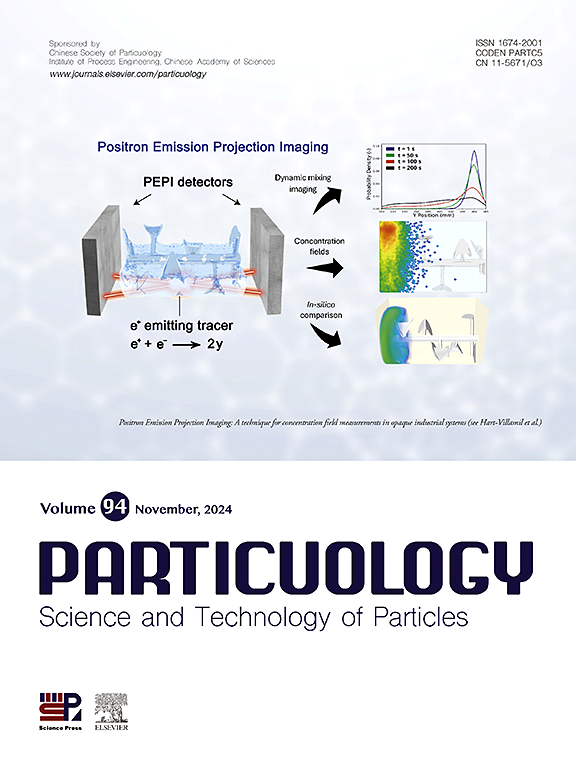基于gpu的FVM-DEM耦合框架及其在气液固三相流中的应用
IF 4.3
2区 材料科学
Q2 ENGINEERING, CHEMICAL
引用次数: 0
摘要
气液固三相流在各个领域都很常见,准确、高效地描述其动态行为至关重要。为了更好地进行气液固三相仿真,开发了基于GPU的CoSim-FVDEM耦合程序,将有限体积法(FVM)与离散元法(DEM)相结合。此代码包含未解析,已解析和已解析-未解析耦合方法,使其适用于涉及各种尺寸的固体颗粒的三相流动模拟。通过复杂溃坝水流、旋转压路机内单球和多球入水试验等一系列实例验证了所开发耦合算法的准确性。最后,进行了双分散颗粒体系在旋转滚筒中的气液固三相流动数值实验。在此基础上,分析了三相流的动态特性,并对计算效率进行了评价。结果表明,所建立的耦合程序可以较好地用于大规模气液固三相流动的动力学分析。本文章由计算机程序翻译,如有差异,请以英文原文为准。

A GPU-based FVM–DEM coupling framework and its application on gas-liquid-solid three-phase flow
Gas-liquid-solid three-phase flow is common in various fields, making it crucial to accurately and efficiently describe its dynamic behaviors. To better perform the gas-liquid-solid three-phase simulations, a coupling code based on GPU named as CoSim-FVDEM is developed, which combines the finite volume method (FVM) and the discrete element method (DEM). This code encompasses unresolved, resolved and resolved-unresolved coupling methods, making it suitable for three-phase flow simulations involving solid particles of various sizes. A series of cases are conducted to validate the accuracy of the developed coupling algorithm, including complex dam breach flow, water entry test of a single sphere and multi-sphere within rotating roller. Finally, a gas-liquid-solid three-phase flow numerical experiment is performed, which involves the bi-disperse granular systems in a rotating roller. Base on the numerical results, the dynamic behaviors of the three-phase flow are analyzed and the computational efficiency is evaluated. The results indicate that the developed coupling code can better be used for the dynamic analysis of large-scale gas-liquid-solid three-phase flow.
求助全文
通过发布文献求助,成功后即可免费获取论文全文。
去求助
来源期刊

Particuology
工程技术-材料科学:综合
CiteScore
6.70
自引率
2.90%
发文量
1730
审稿时长
32 days
期刊介绍:
The word ‘particuology’ was coined to parallel the discipline for the science and technology of particles.
Particuology is an interdisciplinary journal that publishes frontier research articles and critical reviews on the discovery, formulation and engineering of particulate materials, processes and systems. It especially welcomes contributions utilising advanced theoretical, modelling and measurement methods to enable the discovery and creation of new particulate materials, and the manufacturing of functional particulate-based products, such as sensors.
Papers are handled by Thematic Editors who oversee contributions from specific subject fields. These fields are classified into: Particle Synthesis and Modification; Particle Characterization and Measurement; Granular Systems and Bulk Solids Technology; Fluidization and Particle-Fluid Systems; Aerosols; and Applications of Particle Technology.
Key topics concerning the creation and processing of particulates include:
-Modelling and simulation of particle formation, collective behaviour of particles and systems for particle production over a broad spectrum of length scales
-Mining of experimental data for particle synthesis and surface properties to facilitate the creation of new materials and processes
-Particle design and preparation including controlled response and sensing functionalities in formation, delivery systems and biological systems, etc.
-Experimental and computational methods for visualization and analysis of particulate system.
These topics are broadly relevant to the production of materials, pharmaceuticals and food, and to the conversion of energy resources to fuels and protection of the environment.
 求助内容:
求助内容: 应助结果提醒方式:
应助结果提醒方式:


